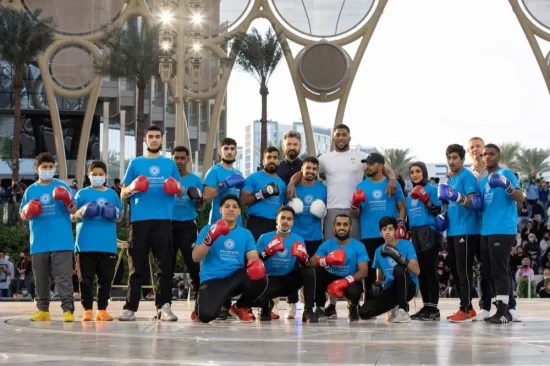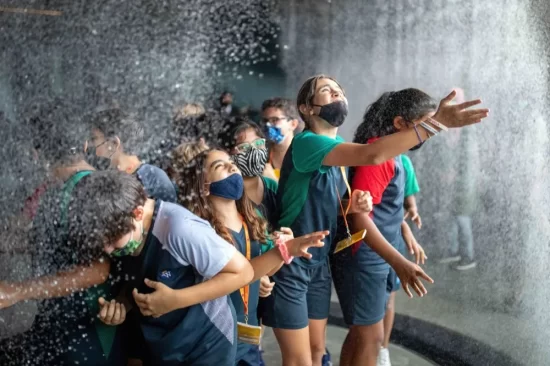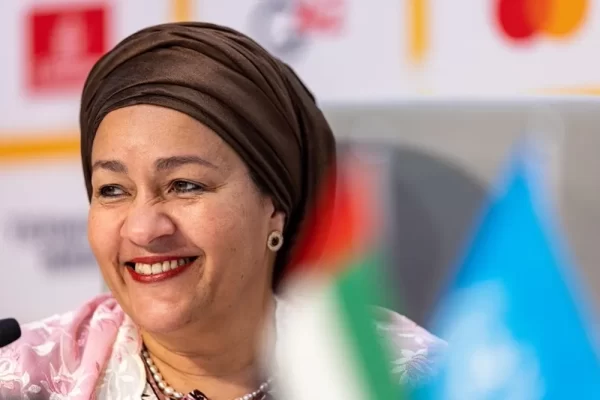DUBAI, 05 January 2021 – Anthony Joshua, one of the world’s most eminent professional boxers, speaks about getting it right in 2022, putting mental health first, the importance of going to bed before midnight, and why men and women should be treated equally in this ‘blood sport.’
Can you tell us what you’ve seen so far at Expo 2020 Dubai?
“I’ve seen the future plans of what’s going to happen in three months’ time when Expo 2020 is over, so I’ve had a glimpse into the forever building, forever continuing [the] future of Dubai. And it’s phenomenal.”
Health and wellness is one of Expo’s Themed Weeks later this month. How do you manage your own body, both physically, mentally, to get to the top of your profession?
“I think mental comes before physical. You make that commitment to yourself when you’re going to make a change for the better, whether it’s physical, or a mental approach to your health and your diet. Once you have that mental charge, everything falls into place. Mental health is a difficult one, but it’s important. I have mental challenges which affect how I can perform in the gym. I can’t always be the strongest and the fastest, but if you keep your mental health intact, everything else follows.”
How do you deal with the adulation, and the spectre of people wanting a piece of you?
“You have to kind of look at your energy. It’s like a phone which is constantly buzzing: you have to know when to turn it off and plug it into charge. A lot of people deserve my energy; I don’t take my position for granted. It’s a blessing and they support me, they love me and they connect with me. But when I’m in my room I recharge. Then, as soon as I leave I’m ready to give 100 percent to the world. It’s a duty. I signed up for it. I can’t have it any other way, so I have to embrace it.”
‘Connecting minds, creating the future’ is the motto at Expo 2020 Dubai. What does the future look like for you?
“New environments and new challenges. We had a little crisis in 2021 and we have to get it right in 2022. Rebuilding, living in adversity and finding joy in it, because that’s where greatness is found. In my career, when there are hiccups, there are problems that need solutions. If we can focus on solutions we can have success.”
Are you leaving no stone unturned in your quest to get back to the top?
“Yes, you have to. I’ve also learnt quality over quantity; I’m not going to spread myself thin. Let’s focus on what’s needed, which has to come from the top down. I’m the last piece of the puzzle.
“I’ve got great people around me, so I can’t take all the credit, but, from all these voices, you also have to pull in and sieve out what’s good, and what’s not. I save what I need. And the only time I’ll figure out if it works or not is when the final bell is run.”
How do you assess the heavyweight division as we stand today?
“I am the heavyweight division. I’m a serious fighter and I fight everyone, anyone. We take care of people’s teams, we put them in great positions. Come fight me. You’ll see what I’m about and what my team is about. We help people earn a lot of money. We help economies, we grow people’s profiles, and we punch each other’s heads in in the process. I love it. I live for this stuff.”
Is fighting against Lennox Lewis still a big thing for you?
“I wanted to box for him for 12 rounds because there’s always been a stigma that I can’t box. I’m a big, stiff body builder. But he won nine rounds. In the next fight I win four more rounds and then I get on the road to be an undisputed champion again.”
Tyson Fury deserves a lot of credit for what he’s done to Deontay Wilder. Is he part of your future?
“Tyson Fury, Wilder… all of them are a part of my legacy.”
Your story is an incredible one. When you look back, what is the one moment that you continue to come back to see?
“When I started out I was a young kid leaving school. I was into football, smoking, going out, using a fake ID to get into clubs, which was normal in my environment. But there came a time when I went to the boxing gym and I remember throwing up – it felt like all of the kebabs, cigarettes and drinks were exiting my body. It was a purification of my body and soul. So, I started changing a lot of things that I was doing, and that was a defining moment; there comes a day in your life that you can commit to positive change. I’m done with sleeping in late and with going to bed after 1200. That’s how you get your job, and that’s how you end up helping your mom or helping your dad.
“When I made the commitment to be healthy, I was able to compete at a higher level because I became fitter, stronger and smarter. That’s how I elevated free boxing quickly.”
How can you and male role models in the sport help your female equivalents to get equality in the sport?
“Let’s give credit to female boxers Ramla Ali, Katie Taylor, Tessa Jones… so many good female fighters. Then you’ve got like the likes of myself, Fury, Wilder and Dillon… all big assets. So, it doesn’t matter if they’re female or male. We want to see females do well in the sport. It’s a blood sport; it’s not the norm to see females doing it, but if they want to progress in the sport, I’m open to supporting anyone that wants to do well in boxing.”
























